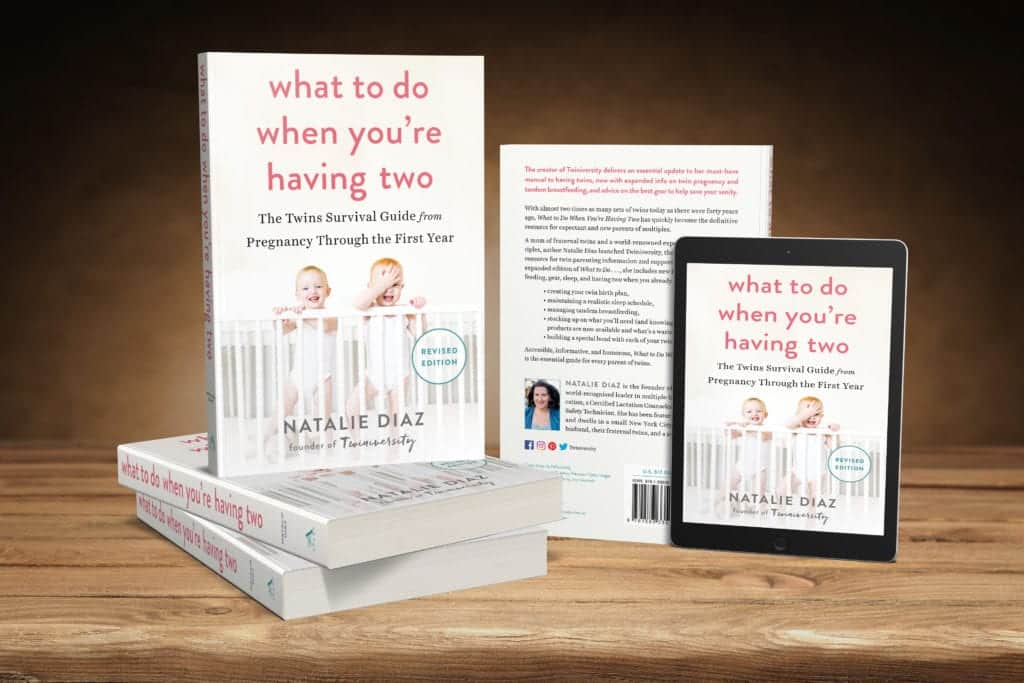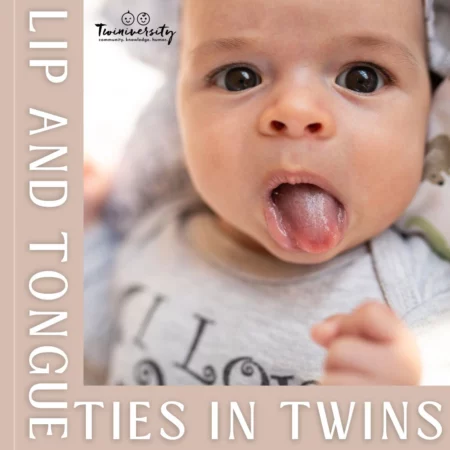Last updated on November 2nd, 2023 at 10:23 am
Learn what to expect with your infant twins week 16, including tips, tricks, and advice from real twin parents who have been there.
All content on this website, including medical opinion and any other health-related information, is for informational purposes only and should not be considered to be a specific diagnosis or treatment plan for any individual situation. Use of this site and the information contained herein does not create a doctor-patient relationship. Always seek the direct advice of your own doctor in connection with any questions or issues you may have regarding your own health or the health of others.
Your Twins Week 16
Welcome back returning twin parents! Hello and welcome to the new twin parents who are just finding us today!
You made it through your first three months as a twin parent and you’re now well into your fourth month of twin parenthood. This is a huge accomplishment. Little known secret: we knew you could do it!
Now what? Well, this is a good place to start. We have plenty of information and resources to help you navigate twin parenting with your twins week 16.
These first months are full of excitement, questions, and even some anxiety. Not to worry, we’ve got your back. We’ve laid out all our best tips, tricks, and advice for twins week 16.

What to Expect with Twins Week 16
- Got preemies? Make sure to consider your premature twins’ corrected age when reviewing whether or not they are meeting their milestones at appropriate times. In the vast majority of cases, preemies catch up by school-age and go on to succeed at the same level as their peers. Read more about preemie milestones here
- Try not to compare your twins to each other, even if they are identical. It’s common for one twin to leap ahead a little on the development front. They may even take turns. It’s very likely that they will motivate each other to hit milestones sooner than they would if they were born a singleton. Monkey see, monkey do! Learn more about trying not to compare twin here
- Your twins may start combining sounds and syllables so that they sound like “words”, but they don’t have any meaning just yet.
- Your twins should enjoy tummy time more now that they are stronger. If they haven’t already, they are about to push up on their arms and support the weight of the upper body, if only for a few moments. Learn how to jazz up tummy time here
- Talk to your twins to help them develop early language comprehension. Tell your twins what you’re doing and describe what goes on around them to help them connect your words with objects and concepts. For example, every time you dress them, say the names for all of their body parts.
- Going back to work soon? Read more about going back to work tips here
- Are you planning to pump at work? Have no clue where to start preparing? We’ve got you covered. Learn more about pumping at work here.
- Your twins’ may soon start to flip over. You’ll start to see them rocking from side to side. They will probably flip from front to back first. When you see them starting to roll, begin the transition out of a swaddle and into a sleep sack (wearable blanket). Try the Love to Dream Transition Bag for when they start to roll (buy on Amazon)
- Your twins may start teething soon. This may cause sleep disruption. Learn more tips for teething here.
- If you’re noticing more drooling, this common when babies are teething and/or if they have a cold/stuffy nose. It’s nothing to worry about, but if you notice a rash forming use Aquaphor healing ointment (buy on Amazon) to keep it under control.
- You may want to start taking your twins to baby classes, story time at the library, and other baby events. Now is a great time to do it while they are still immobile. Once they are on the move it will be very challenging to take them to these events without another adult to help.
- Get ready for that first giggle any day now! Make a fun game of tickling your baby while making a funny sound to get them to laugh with you. This is a fun way to enjoy a little 1-on-1 time with each twin. Right after tummy time is perfect for this!
- Now is a good time to start putting your babies to sleep “drowsy, but awake”. Lay them to bed on their backs while still awake and leave the room. This will help them start to learn how to self soothe. They will probably cry and want to be picked back up, which is OK — you should do that, then settle them down and try again. Just keep trying and don’t feel defeated if it doesn’t work for a while. Practice is what we’re looking for right now.
- Your babies can now identify your face, voice, and smell. When they hear you speak or sing, they will know you are just around the corner.
- Keep your babies on a blanket or play mat on the floor as much as possible during the day. Put toys and baby mirrors around them to encourage them to reach out and begin to move.
- Try to limit using baby containers (bouncy chairs, swings, etc.) for no more than 30 minutes at a time. Learn more about Container Baby Syndrome here
- Your twins will by now be putting their fingers into their mouths and trying to grasp objects and bring them to their mouths. Be extra careful about what you leave out within the twins’ reach. Anything that can fit through a toilet paper roll can get lodged in your baby’s throat.
- Expect to go through 70-100 diapers per week for twins through 30 weeks old (roughly 7 months). (buy on Amazon). If your diapers are leaking on a regular basis, that’s the sign that you need to move up a size.
- You’re probably still doing 6 feedings a day (every 4 hours). Make sure you’re feeding your babies at the same time and putting them down to sleep at the same time to keep them together on a schedule. Learn more about bottle-feeding here
- Babies are eating typically 4 – 6 oz at each feed for twins 4 months old, but if your babies are preemies they may be eating less. Ask your pediatrician what is the appropriate amount for your babies based on their weights.
- You can expect your twins to gain around 6-8 oz each week now. They need sleep in order to grow. Research shows that 80% of growth hormone is secreted during slumber.
- Start practicing good hygiene to prevent illness but don’t go overboard with the anti-bacterial wipes. Some contact with germs in important for your twins. Baby’s immune system will not be given the opportunity to develop properly without having things to fight. Aim to keep things “clean” rather than “sterile”. This will ensure your home is safe from harmful germs yet suitable to allow their immune systems to develop properly.
- By now, your twins will be sleeping about 15 hours every day. About 10 of those will be at night and the other 5 hours will be broken into 3 naps during the day. See our feeding and napping schedule below for a sample schedule.
- Now is a good time to start a bedtime routine. A bath, a book, a feeding, a lullaby, and down to sleep is a great routine. This pattern will cue your babies to learn that “bedtime” is starting. Do the same thing every night and they’ll start to catch on to your cues. Learn more about bedtime routines here
- Your twins may be ready for sleeping training/coaching. Deciding on the right time to sleep train is a very personal decision that you need to make WITH your partner. But your twins might not be ready to sleep through the night yet and that’s totally normal. Many parents have success with sleep training around 5-6 months old. Read more about sleep training here
- Your babies should be placed to sleep on their backs on a firm, flat surface with only a tightly-fitted crib sheet. No blanket, no toys, no bumpers, no flat sheets. You baby should wear a swaddle blanket or wearable blanket for warmth and comfort. Do not sleep your babies on an inclined surface (learn why here). Following these recommendations will greatly reduce the risk of SIDS and accidental suffocation. Learn more about SIDS here
- If you haven’t already started, now is the time to start baby proofing! Once your twins start crawling you will thank us! You’ll want to baby proof every room in your house but each room will need a different variety of babyproofing tools. If you’re not a handy person you may want to hire a professional babyproofer to come in and set you up. Read more about making your home safer here
- If you haven’t already, look into joining a local moms of multiples club (aka twin club). Read about local twin clubs here
- If at all possible, now may be a good time to have a trusted adult (or two) stay overnight with the twins so you and your partner can have a little getaway. If you’re lucky to have a nanny, babysitter, or loved one who is familiar with your twins enough to stick to their schedule and they are willing to do an overnight, a night away at a hotel with just you and your partner will do WONDERS for your relationship.
Want to be the first to know about giveaways, deals, and more just for twin parents? Sign up for the Twiniversity email list! Subscribe today to get emails about giveaways, events, weekly article roundups, and more! Pregnant with twins? We’ll be sending you a weekly twin pregnancy email to keep you on track with your pregnancy to-do list! Click here to learn more… and while you’re at it, check out our Complete Baby Safety Course and Twin Parent Memberships.
Common Concerns From the Moms Who Have Been There With Twins Week 16
- How can I sleep train my twins at the same time?
- What can we do to help alleviate teething symptoms?
- What is the best way to deal with sleep regression?
- How will we manage the cost of raising twins?

The Twins Tale Podcast by Twiniversity is an intimate look into the lives of twin parents and their twins at all ages and stages, from birth through college. We interview twin parents in the trenches and ask all the burning questions you want to know about raising twins: schedules that work, feeding your twins, getting out of the house, finding sanity, and so much more. Subscribe for FREE today!
Milestones & Developmental Leaps Parents Have Noticed With Twins Week 16
What’s going on with development in twins week 16?
- You may see (and hear) your twins attempting to mimic sounds you are making at them or making cooing noises, as if they are practicing communication skills. Talk to them often so they can practice.
- Your twins curiosity has them demanding to sit up and look around more often this week. They may even attempt to sit up on their own, although they don’t have the ability to do it on their own just yet.
- Your babies may start to notice each other. Don’t worry if they don’t yet, though. It’s a common misconception that newborn twins know they are a twin. They don’t! They are in their own little world and don’t notice their twin is even there for a while. But once they do — look out! Keep your camera handy to capture all the amazing twinnie moments to come!
- One or both of your twins may be showing signs of teething this week. They may be fussy, drooling, and irritable as they begin to cut their first tooth. Check out some of our best teething tips here.
- Your twins may begin to roll from front to back this week, although many babies don’t do this until around 4 months. When you notice they are starting to roll you should transition them out of the swaddle and into a sleep sack (this one is great for transitioning)
- This is the age when many infants begin to recognize repetition. Switch up your day to keep them from getting too bored.
- Your twins may finally be sleeping for longer stretches. Remember that sleep regression is a temporary part of this developmental leap and it will be over before you know it. Learn more about sleep training here.
- You will probably notice your twins blowing raspberries with their lips and mimicking mouth movements as they learn to manipulate their mouths by watching you.
- Your twins will start to practice reaching and grasping. Surround your twins with lightweight toys that fit in one hand. Make sure to keep hazards out of reach, such as strings, cords, small items they can choke on, hot drinks/food, etc. Read more about childproofing here
Challenges You Might Experience With Twins Week 16
There are some challenges to look out for with twins week 16
- Sleep regression. See how to get more sleep with twins here
- Teething symptoms may make life difficult for the whole house this week. Learn about relief for your teething twins here
- Finding reliable childcare when heading back to work often creates a lot of stress and anxiety for new twin parents. Check out some of our tips here
- You may start to notice your friends/family aren’t coming around as much. As time goes by you may find people assuming you don’t need help anymore. Speak up if this is not the case! Most parents of twins really appreciate help even though the first year and beyond but your loved ones may have no clue unless you tell them.
- You may start to notice a change in your friendships, especially with those who don’t have kids and/or twins. Read about changing friendships here and how to make new friends here.

Tips from Parents of Twins Week 16
Take some tips from experienced twin parents!
- Use a sleep sack when you can’t use a swaddle anymore to keep them warm and safe in the crib.
- Read to your babies often. They will love it and it will become a habit as they get older.
- Play music for them often. The sound and vibrations will occupy them and soothe them.
- Sit them upright for at least 20 minutes after eating to help with gas.
- Bottle prep. Especially at night!
Personal Advice from Parents of Twins Week 16
“You are amazing and you can do so much more than you think you can. If you try something and it doesn’t work out be kind to yourself but again you will be surprised at what you are successful at. Don’t ever limit yourself without trying. I have accomplished so much more that I thought I couldn’t, but so glad I at least attempted.”
Hannah S.
“Breathe! When my one twin was fussing during a night feed, we were very stressed and frustrated. It’s okay to be frustrated, and taking a deep breath helps. Use your pediatrician and triage nurse when you aren’t sure. Not Google! Pack and plays are essential (buy on Amazon). My twins are outgrowing their twin bassinets and we have one pack and play and are ordering another so we can follow safe sleep practices. Self care. I just got a massage and feel like a new person and am ready to take on the world of twin parenting again!”
Tristan H.
“When one wakes to feed, wake the other. Increase the amount of milk/formula once they are 10+ lbs. Be open to advice from other moms, but take it with a grain of salt. Track times for feeding/sleeping. Don’t forget tummy time.”
Candice L.
“Use musical and light up toys to help make tummy time fun for everyone, read to them and show them the pictures, help them practice holding on to toys and get something musical that can attach to their crib they can play with and be entertained while you are helping their sibling.”
Breanna M.
“Rotate one twin in swing and one in bouncer to change it up! Bottles of breastmilk for middle of the night feeds (they sleep longer because you know how much they’re taking in). Accept help when it’s offered and ask for it when you need it. Buy a baby wrap to wear one when both are being fussy.”
Lauren H.
12 Ways to Capture Twin Milestones
Got twins? Us too! The Twiniversity Podcast with Natalie Diaz was created BY parents of twins FOR parents of twins, from your pregnancy days through your twin’s teenage years, this podcast covers it all. It’s all about parenting twins, offering plenty of strategies for making life better, parenting hacks, and, of course, humor. We are laughing WITH you every step of the way.
Questions You Might Have for Your Pediatrician About Your Twins Week 16
The American Academy of Pediatrics (AAP) recommends babies get doctor checkups at birth, 3 to 5 days after birth and then at 1, 2, 4, 6, 9, 12, 15, 18 and 24 months. Reminder that twins = two co-pays for each doctor’s visit.
- Should we switch to a sleep sack from a swaddle even if they haven’t rolled over yet?
- What is the best way to sleep train twins?
- How can I tell if they’re teething?
- When can we drop the night feeds yet?
- What milestones should we be on the lookout for now?
You Might Want These Items for Your Twins Week 16
- Fisher-Price Kick and Play Piano Gym (buy on Amazon)
- Munchkin Mozart Music Cube (buy on Amazon)
- Soft sensory books (buy on Amazon)
- Baby monitors (buy on Amazon)
- Double stroller (check out our double stroller guide here)
- Aquaphor healing ointment (buy on Amazon)
- Structured baby carrier (buy on Amazon)
- Teethers (buy on Amazon)
- White noise machine (buy on Amazon)
- Tummy time mat (buy on Amazon)
- Baby Brezza Formula Pro Advanced (buy on Amazon)
- High chairs (buy on Amazon)
- Crib Mobile (buy on Amazon)
- Bokee (buy on Amazon)
- Sit-Me-Up Floor Seat (buy on Amazon)
- Romp & Roost LUXE Playard (learn more)
- Love to Dream SwaddleUP (buy on Amazon)
- Love to Dream Transition Bag for when they start to roll (buy on Amazon)
- NoseFrida the “Snotsucker” (buy on Amazon)
- Baby toys like the Whoozit (buy on Amazon), the Winkle (buy on Amazon), Take Along Tunes (buy on Amazon), and a floor mirror (buy on Amazon)
- For more recommended baby products, click here
You Might Want These Items for Yourself
- Twins monthly milestone baby blanket (buy on Amazon)
- Milestone baby photo cards (buy on Amazon)
- Self-care items such as makeup, hair products, new clothes, or anything to make you feel human again
Feeding and Nap Schedule for 4 Month Old Twins
A schedule with twins week 16 is key! Let’s just say that the importance of scheduling and organization when you are outnumbered by twins simply cannot be overstated now that the twins are becoming more alert and demanding of your time and attention.
Here is a feeding and nap schedule for twins week 16 (almost 4 months old). You can see that adding tummy time before each nap is a good way to ensure they are getting enough of it throughout the day.
- 7 am feed
- 8 am tummy time and play
- 9 am nap
- 10 am wake and play
- 11 pm feed
- 12 pm tummy time and play
- 1 pm nap
- 2 pm wake and play
- 3 pm feed
- 4 pm tummy time and play
- 5 pm nap
- 6 pm wake, bath, and book
- 7 pm feed and down for the night
- 11 pm feed and back to bed
- 3 am feed and back to bed
- When your doc gives you the OK to stop waking them up at night, feed both babies when the first baby wakes and cries to eat and get them back to sleep ASAP.
The trick here is to stick to the schedule as best you can. Things will happen to break your routine. That’s okay. Just get back to it asap. The quicker you can get back on track, the easier it will be on you and your twins.
Do everything in your power to feed your twins together to make sure you get breaks. If they are on opposite feeding schedules, you will never get a break — and you deserve one!
Sleep Advice From the Sleep Lady
If you’re beginning to feel like your twins may never get the hang of consistently sleeping through the night and napping reliably, you aren’t alone. We can assure you that eventually things really DO get better in the sleep department. Even with twins!
There are some things you can do to help get some more shut eye for you and your twins, and ensure some good sleep patterns for you to enjoy for years to come. Being aware of what is coming can help you not only prepare, but get through it. Sleep regression is real.
The Sleep Lady, Kim West, LCSW-C says: “Babies may experience sleep regressions starting around 3 to 4 months, again at 8 to 10 months, 12 months, at 18 months, and again at 2 years; the most common sleep regressions occur at 6 weeks, 4 months, and 6 months. It is fairly uncommon for a baby or toddler to have a full-blown sleep regression with every developmental milestone.”
See more of what The Sleep Lady Recommends about your newborn twins’ sleep here.
When to Call the Doctor
It’s better to overreact 100% of the time than to underreact once.
Natalie Diaz, Twiniversity Founder and Mom of Twins
All content on this website, including medical opinion and any other health-related information, is for informational purposes only and should not be considered to be a specific diagnosis or treatment plan for any individual situation. Use of this site and the information contained herein does not create a doctor-patient relationship. Always seek the direct advice of your own doctor in connection with any questions or issues you may have regarding your own health or the health of others.
When it comes to calling your doctor or seeking medical advice, you have to learn to trust yourself. No one knows your babies like you do and if you feel something isn’t right, it probably isn’t. When in doubt, call. A good pediatrician will NEVER make you feel stupid for being concerned about your twins well-being. Remember that and hire and fire accordingly.
That being said, there are a few guidelines to follow. There are a few circumstances under which you should call your doctor and get medical advice, or even call 911. When you call you should have a pen and paper handy and be prepared to give the following information over the phone:
- Immunization records
- Any medications, dosages, and times last taken (even over the counter drugs)
- Medical history
- Your baby’s temperature
- Mention that the baby is a twin, in case of a contagious illness
Any time you see the following symptoms with your twins you should contact your pediatrician immediately.
- Blood in vomit
- Blood in stool
- Seizure
- Suspected poisoning
- Bleeding you cannot stop
- Unable to move
- Limpness
- A rectal temperature of 100.4 or above
- Sleeps more than usual or will not wake up
- Yellow skin or eyes
Call your doctor as soon as possible if one or both of your twins experiences any of the following.
- Refusal to eat for multiple feedings in a row
- Diarrhea or vomiting
- A cold that will not resolve itself or gets worse
- Unexplained rash
- Signs of dehydration (no tears, no wet diapers, sunken eyes, sunken soft spot)
- Ear drainage
- Will not stop crying
When to Call 911
Please note that when you call 911, you and your baby will be taken to the nearest emergency room. This may or may not be located at your preferred hospital.
- Your baby is turning blue or taking more than 60 breaths per minute
- Your baby has a seizure which lasts more than 3 minutes or you cannot reach their doctor by phone immediately
- Suffers from convulsions, unconsciousness, or irregular breathing following a fall or from bleeding
- You think your baby may have a skull, neck, back, or pelvic fracture (DON’T move your baby)
- Your baby suffers from a compound fracture where bone is sticking out from the skin (cover it with a clean cloth and do not touch it)
- Your baby has bleeding you cannot stop after applying pressure for 10 minutes
Again, learn to trust your gut. When in doubt, call and see what your doctor thinks. That’s what they’re there for.
What You Should Read for Twins Week 16
- Best Health and Safety Articles
- The Best Bottle Feeding Positions for Twins
- Marriage Problems with Twins? You’re Not Alone
- The First Time I Left My Baby With a Sitter
- Why You Need to Leave the House Every Day
Need some twin parent friends? Get the support you need with a Twiniversity Membership. Benefits include a monthly twin parent club meeting on Zoom, access to a private Facebook group just for twin parents, and a video library of twin parenting lessons. Visit Twiniversity.com/membership to join today!
Don’t Forget to Do These Things With Twins Week 16
You probably feel like you’re starting to get your bearings with twins week 16. At the very least, you are probably beginning to settle into chaos as your normal. It’s getting a little better each week with regards to sleep and routine. Good news is that it will continue to get better each week! We have put together a short list of a few things to remember that might help you out a bit.
- Use your phone or a notepad to track milestones. You will never be able to remember who got which tooth first and later is a relative term. Track it when you can and compile it all in a book later.
- Put on your own oxygen mask first! Take care of yourself! Eat well, drink water, rest when you can, and try and take 10 minutes for yourself everyday.
- Keep in close communication with your pediatrician. Keep a running list of questions or concerns to bring up at the next appointment so you don’t forget. If you don’t write it down, you WILL forget it. Call the office anytime to ask more pressing questions.
- Teamwork makes the dream work! Burn out happens faster than you might think with twins! When it becomes too much, lean on your partner, a family member, or friend and tag them in for a bit. If you have support, let them support you.
Are You a New Twin Parent?
Check out Natalie Diaz’s book:
“What To Do When You’re Having Two
The Twin Survival Guide From Pregnancy Through the First Year”
In What to Do When You’re Having Two: The Twins Survival Guide from Pregnancy Through the First Year, national twins guru and founder of Twiniversity (and twin mom herself!) Natalie Diaz provides a no-holds-barred resource about life with twins, from pregnancy and birth all the way through your duo’s first year of life.
Accessible and informative, What to Do When You’re Having Two
is the must-have manual for all parents of twins.
An excerpt from Twiniversity founder Natalie Diaz’s book, “What To Do When You’re Having Two“
To Sleep Train, Perchance to Dream
Sleep training is a controversial topic among parents. In case you are unfamiliar with this term, sleep training essentially means teaching your children how to comfort themselves so that they can put themselves to sleep. This means that you do not rock, nurse, sing, or bounce your babies to sleep, but instead put them in their cribs awake and let them learn how to fall asleep themselves. Dr. Richard Ferber first popularized this concept, and so some people call it “Ferberizing” your babies. Another term for this method is, “cry it out,” because, yes, there will be some crying involved.
But when you use these methods, you are not really training your babies to “sleep,” but rather to soothe themselves. When babies are very little, their brains literally aren’t developed enough for them to soothe themselves. They need help settling down to sleep, and you will instinctively find yourself rocking, singing, or nursing your babies to sleep. But it becomes much more difficult to settle your babies down the line at 3 and 4 months when they are heavier, alert, and more easily distracted
Photos of Twins Week 16



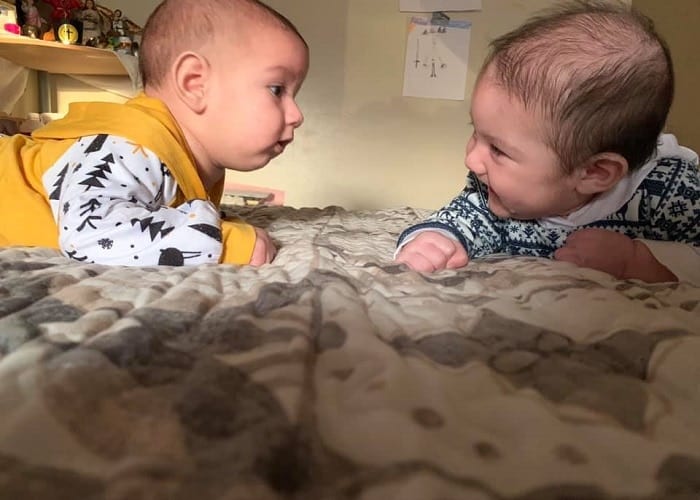
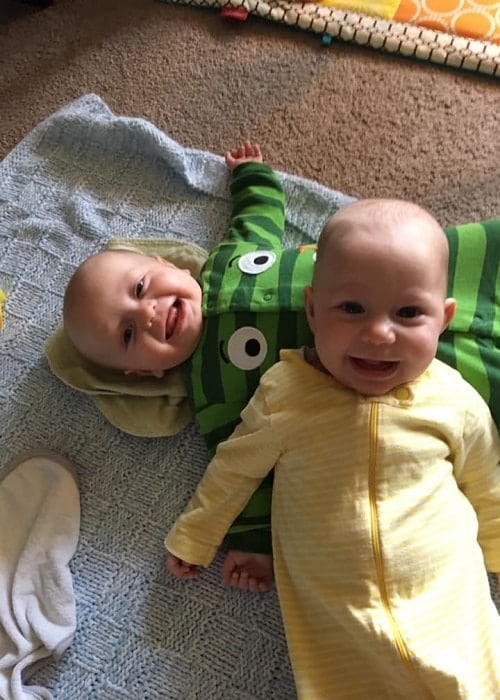



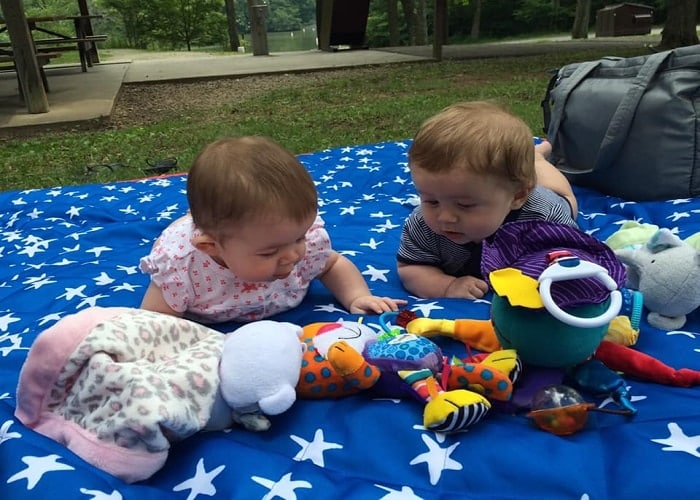
Return to the First Year with Twins Home
Sources
- Dr. Ilona Bendefy, Baby: Day by Day
- Dr. Frans X. Plooij and Dr. Hetty van de Rijt, The Wonder Weeks
- Marple, Kate, and Dawn Rosenberg. “When to Call 911: How to Tell If Your Baby Needs Emergency Care.” BabyCenter
- “Newborn Baby: When to Call the Doctor.” Cleveland Clinic
- “Developmental Milestones: 3 Month.” HealthyChildren.org
- “Physical Appearance and Growth: 4 to 7 Months.” HealthyChildren.org
- WhattoExpect.com “4-Month-Old Baby.” What to Expect, 2 Aug. 2019
- “How Often and How Much Should Your Baby Eat?” HealthyChildren.org
- “How Much and How Often to Feed Infant Formula?” CDC.org





